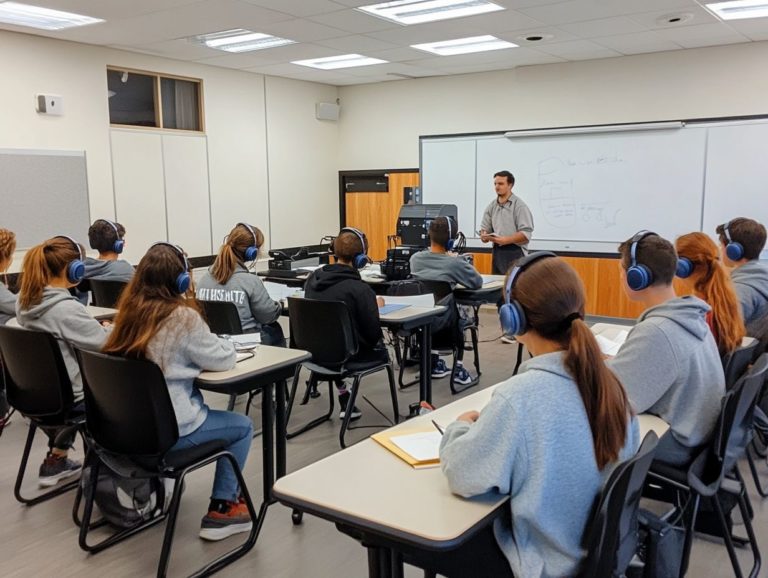5 techniques to overcome language anxiety
Are you ready to conquer your fears and speak a new language with confidence? This article reveals five practical techniques that can transform your language skills!
Language anxiety can pose a substantial barrier to effective communication, often leaving you feeling isolated or frustrated. This article delves into five practical techniques that can help you conquer your fears and build confidence in your language skills. From pinpointing the root causes of your anxiety to practicing deep breathing and visualization, these strategies are crafted to empower you on your journey toward fluent communication.
You ll uncover common triggers and explore long-term solutions that will help you maintain your confidence. Let s navigate the path to overcoming language anxiety together!
Contents
- Key Takeaways:
- 1. Identify the Root Cause of Your Language Anxiety
- 2. Practice Deep Breathing and Relaxation Techniques
- 3. Visualize Successful Communication Situations
- 4. Seek Support and Guidance from a Language Teacher or Therapist
- 5. Take Small Steps and Celebrate Progress
- What Is Language Anxiety and How Does It Affect Communication?
- Frequently Asked Questions
- What is language anxiety and why is it important to overcome?
- What are the 5 techniques to overcome language anxiety?
- How does positive self-talk help in overcoming language anxiety?
- Can visualization be an effective technique for overcoming language anxiety?
- Why is gradual exposure important in overcoming language anxiety?
- How can seeking support help in overcoming language anxiety?
- Are relaxation techniques helpful in overcoming language anxiety?
Key Takeaways:

- Identify the root cause of your language anxiety.
- Practice deep breathing and relaxation techniques.
- Visualize successful communication scenarios.
1. Identify the Root Cause of Your Language Anxiety
Identifying the root cause of the fear or nervousness about speaking a new language (language anxiety) is crucial for you as a student aiming to elevate your learning performance and build confidence in the classroom. This means looking into how external factors, like classroom dynamics and social interactions, play a role in your anxiety levels and impact your self-esteem.
By pinpointing specific triggers whether they arise from past experiences, perceptions of mistakes, or fears of social judgment you can work alongside educators to craft effective coping strategies that enhance communication and create a supportive learning atmosphere.
Common scenarios, like participating in group discussions, delivering presentations, or engaging in role-plays, tend to amplify these feelings. You may often find yourself grappling with self-doubt and the pressure to excel in front of your peers.
Self-reflection is essential in acknowledging these emotions and their origins. Feedback from teachers and fellow students can offer invaluable insights into your perceived strengths and areas for growth.
The emotional impact of language anxiety can be significant, often reshaping how you perceive your identity and leading you to shy away from opportunities where you might face criticism or ridicule.
2. Practice Deep Breathing and Relaxation Techniques
Practicing deep breathing and relaxation techniques can significantly alleviate language anxiety, paving the way for a calmer and more effective learning experience. By integrating these calming practices into your routine, you can enhance your communication skills and diminish the stress that often accompanies language learning.
For instance, consider a simple exercise: inhale deeply for a count of four, hold that breath for another four counts, and then exhale slowly. This method can help settle your nerves before speaking in front of peers. Visualization techniques can also be beneficial; imagine yourself in serene settings while practicing vocabulary or grammar points.
Creating a tranquil atmosphere in the classroom perhaps with soft lighting, soothing colors, or gentle background music can further promote relaxation. Outside the classroom, dedicating a few minutes daily to mindfulness or stretching can reinforce these valuable skills.
Embracing these practices nurtures your emotional well-being and cultivates a supportive environment where your language skills can truly thrive. Start practicing these techniques today and watch your confidence soar!
3. Visualize Successful Communication Situations
Visualizing successful communication scenarios is a powerful technique that can help you combat language anxiety and elevate your overall language performance. This mental practice allows you to rehearse your vocabulary, anticipate responses, and navigate potential stressors tied to real-life interactions.
By vividly imagining situations like ordering food at a restaurant or engaging in a casual chat with native speakers, you can create a mental framework that prepares you for actual encounters. This practice not only helps you familiarize yourself with context-specific vocabulary but also bolsters your self-confidence, making you more resilient to the fear of making mistakes.
To effectively weave visualization into your study routine, set aside a few minutes before each lesson to mentally walk through these scenarios. This approach will reduce stress, enhance retention, and ultimately lead to improved language skills. Start visualizing your success today!
4. Seek Support and Guidance from a Language Teacher or Therapist
Seeking support and guidance from a language teacher or therapist can be a game changer in overcoming anxiety about learning a new language and developing effective coping strategies. These professionals are equipped to offer valuable insights into anxiety management techniques and provide tailored resources that cater to your unique needs.
Educators play a crucial role by cultivating a supportive classroom atmosphere that promotes open communication and encourages peer collaboration. Mental health professionals can enhance the experience by organizing workshops on mindfulness and stress management, giving you the power to face the anxieties that often accompany language learning.
Resources like one-on-one counseling sessions and group activities can further enrich your supportive network. By fostering a deeper understanding of anxiety about learning a new language and implementing structured classroom activities, you build confidence in your language skills and learn to navigate your emotional experiences. This ultimately leads to a more positive and fulfilling educational journey.
5. Take Small Steps and Celebrate Progress

Taking small steps and celebrating your progress is a game changer for managing anxiety about learning a new language. These practices not only build your confidence but also create positive learning experiences.
When you acknowledge even the slightest achievements, you significantly reduce the fear of making mistakes and boost your overall engagement in language learning. Breaking down language acquisition into manageable tasks is key. For example, you might focus on mastering just five new vocabulary words each week instead of overwhelming yourself with an entire chapter.
This gradual approach makes the process feel more approachable and allows you to experience wins that reinforce your motivation. Celebrate these small victories whether through praise, stickers, or a well-deserved treat! Each step counts!
By fostering a sense of accomplishment through these incremental goals, you can alleviate anxiety and transform what may seem like an insurmountable challenge into a series of enjoyable milestones on your language journey.
What Is Language Anxiety and How Does It Affect Communication?
Anxiety about learning a new language is a real challenge you might face as you learn and use a foreign language. It can significantly impact your communication skills and academic performance. This anxiety often leads to negative self-perceptions, shaping your identity in social interactions.
You may find yourself avoiding classroom activities and discussions, which only reinforces your anxiety and stunts your language development.
The psychological effects of anxiety about learning a new language are profound. This tension creates a cycle of fear and avoidance that makes effective communication feel daunting. When you’re under pressure to speak in a foreign language, heightened anxiety during interactions can damage your self-esteem, which is your belief in your abilities, and influence how educators approach language instruction.
Teachers may notice your reluctance to engage, which might lead them to adjust their teaching methods, often unintentionally favoring those who appear less anxious. This dynamic can cultivate an environment where you, as an anxious learner, feel marginalized, complicating your language acquisition and social integration even further.
What Are the Common Triggers of Language Anxiety?
Common triggers of language anxiety can vary significantly from person to person, encompassing a range of factors like the fear of making mistakes, a limited vocabulary, and negative interactions with peers or educators. These triggers often create a cycle of stress in classroom settings, hindering your ability to engage fully in language learning and social communication.
For example, the fear of making mistakes might hold you back from participating in discussions, resulting in missed chances for practice and improvement. If you feel your vocabulary isn’t up to par, you may hesitate to express your thoughts, embarrassed about your language skills.
Negative interactions, whether they’re real or just perceived, can magnify feelings of inadequacy. This can turn the classroom into a less-than-friendly environment that discourages active participation. The dynamics at play, shaped by social hierarchies and the pressure to perform, can intensify these triggers, often leaving you feeling isolated and anxious instead of supported on your language journey.
How Can Language Anxiety Impact One’s Daily Life?
Language anxiety can profoundly influence your daily life, affecting your academic performance, social interactions, and self-esteem. When you carry the weight of this anxiety into everyday situations, your ability to communicate effectively suffers. This can lead to missed opportunities for connection and learning.
In classroom settings, this anxiety often emerges. A fear of speaking up can cause disengagement from discussions and reluctance to participate in group projects. This stifles your academic growth. Similarly, in social environments, feelings of unease can hinder meaningful interactions, making it difficult to form friendships or integrate into peer groups.
Over time, this can lead to feeling more isolated and can adversely affect your self-identity. Recognizing these dynamics highlights the importance of adopting coping strategies, such as relaxation techniques and positive reinforcement. By doing so, you can build resilience and enhance your confidence in both educational and social settings.
What Are Some Common Ways to Deal with Language Anxiety?
Numerous effective ways exist for managing language anxiety, from relaxation techniques to seeking support from educators or peers. These strategies give you the power to build resilience and navigate the challenges that anxiety presents in language learning environments.
Along with these techniques, adopting proactive approaches like engaging in regular practice and setting realistic goals can significantly enhance your confidence and reduce feelings of apprehension.
Many individuals find mindfulness exercises particularly beneficial, as they promote a state of calm and reduce the impact of negative thoughts. Seek constructive feedback from supportive peers to recognize your progress and pinpoint areas for improvement, fostering a positive mindset toward language acquisition.
Tapping into external support systems, such as study groups or counseling services, offers valuable encouragement and perspective. Ultimately, combining personal practices like journaling or self-reflection with external resources creates a comprehensive approach to effectively alleviate the symptoms of language anxiety.
How Can Language Anxiety Be Overcome in the Long Term?

Overcoming language anxiety in the long term requires a multifaceted approach, blending effective strategies, consistent practice, and a solid support system. Actively engaging in language learning and utilizing available resources can gradually reduce your anxiety and elevate your communication skills.
Regular practice is key in combating language anxiety. You can achieve this through various methods, like joining language exchange meetups or participating in online conversation groups. Immersing yourself in real-world contexts like watching movies or reading books in your target language can significantly boost your confidence.
Prioritizing your mental health throughout this journey is crucial. Maintaining a balanced approach not only alleviates stress but also transforms the learning experience into something genuinely enjoyable.
What Are Some Tips for Maintaining Confidence and Managing Language Anxiety?
Maintaining confidence while navigating language anxiety is essential for a successful language learning experience. You can employ several practical strategies to help you tackle the fear of using a foreign language.
By fostering a positive classroom environment and actively seeking constructive feedback, you can enhance your confidence and reduce stress. A supportive atmosphere among peers makes a huge difference!
When classmates encourage one another, it fosters a sense of belonging that diminishes feelings of isolation. Engaging in positive self-talk helps cultivate an optimistic mindset, reminding you of your progress and potential rather than dwelling on shortcomings.
Establishing a routine for receiving constructive feedback gives you the power to see challenges as opportunities for growth. This makes the language acquisition process feel much less intimidating.
These strategies boost your confidence and alleviate the anxiety often tied to learning a new language, allowing you to approach your studies with renewed enthusiasm.
Frequently Asked Questions
What is language anxiety and why is it important to overcome?
Language anxiety is the fear or nervousness that individuals experience when using a second or foreign language. It is important to overcome because it can hinder language learning and communication, leading to negative experiences and feelings of inadequacy.
What are the 5 techniques to overcome language anxiety?
The 5 techniques to overcome language anxiety are: positive self-talk, visualization (imagining positive outcomes), gradual exposure, seeking support, and practicing relaxation techniques.
How does positive self-talk help in overcoming language anxiety?

Positive self-talk involves replacing negative thoughts and beliefs about language learning with positive and encouraging ones. This can boost confidence and reduce anxiety levels when using a second or foreign language.
Can visualization be an effective technique for overcoming language anxiety?
Yes, visualization involves imagining successful and positive language learning experiences. This can help decrease anxiety and increase confidence when using a second or foreign language in real-life situations.
Why is gradual exposure important in overcoming language anxiety?
Gradual exposure refers to slowly increasing the amount and complexity of language use in a comfortable and controlled environment. It can help individuals build their confidence and reduce anxiety levels before using the language in more challenging situations.
How can seeking support help in overcoming language anxiety?
Seeking support from peers, teachers, or language-learning communities can provide a sense of comfort and belonging. This reduces feelings of isolation and inadequacy that often accompany language anxiety. It also provides opportunities for practice and feedback, which can improve language skills and confidence.
Are relaxation techniques helpful in overcoming language anxiety?
Yes, practicing relaxation techniques such as deep breathing, mindfulness, or progressive muscle relaxation can help individuals manage their anxiety levels. This leads to increased feelings of calmness and control when using a second or foreign language.
Start practicing these techniques for language learning through travel today to boost your confidence and manage language anxiety more effectively!





